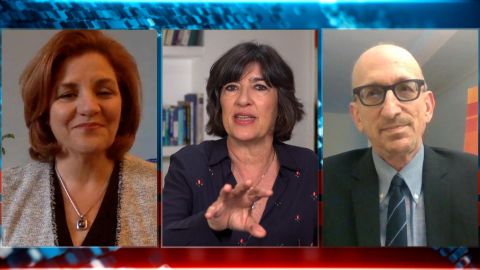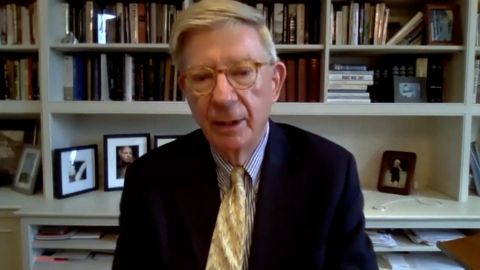Read Transcript EXPAND
CHRISTIANE AMANPOUR: the hardening divisions between Republicans and Democrats are impacting everything from the economy to
infrastructure to voting rights, as we’ve just been mentioning.
George Will, one of the country’s most well-known libertarian conservative journalists has been following that evolution for decades. And here he is
now with our Walter Isaacson discussing his take on the current state of the nation.
(BEGIN VIDEOTAPE)
WALTER ISAACSON: Thank you, Christiane. And, George Will, welcome to the show.
GEORGE F. WILL, PULITZER PRICE-WINNING COLUMNIST: Glad to be with you.
ISAACSON: This week, Congress is debating various voting rights, proposals. You called one of them — you called the Democratic proposal
before the people a constitutional desecration. Why are you so against it?
WILL: Well, first of all, the constitution is extremely clear that the primary responsibility for conducting elections rests with state
legislatures, and there is no particularly compelling reason to change that. There is a lot of, I think, sympathetic hysteria on the left about
the voting bills passed around the country. As voter suppression bills. A great many of the measures sort of being passed are simply going back to
the status quo ante. That is status quo before the extra measures taken into the liberalized voting procedures because of the pandemic.
So, as I said there is a lot of — I think people are more alarmed by the voting bills than there are people reading the voting bills. I’ve notice
when the Major League Baseball decided to move the All-Star Game from Atlanta to Denver, I predicted to some friends of mine in Major League
Baseball, they would take about 10 minutes for journalists to find in Colorado voting provisions that are more restrictive, if you will, than the
voting provisions — some of the voting provisions in Georgia. And then 10 minutes is about how long it took.
ISAACSON: Well, you say it is constitutional desecration because some of these bills would determine how states can run elections. But I remember
you once wrote that the 1965 Voting Rights Act was one of the noblest and best things Congress had ever done. Wasn’t that also determining how
elections should be run in states?
WILL: Sure, it was. And it was to address an egregious century-long post- civil war violation of the spirit of the 14th Amendment and I believe the letter of the 14th Amendment. That is a very different situation than we
are today, which although advocates of H.R. 1 and S. 1, the two bills in question here, say this is the resurrection of Jim Crow. That is, as I say,
people go from 0 to 60 hysteria in about 10 minutes in today’s political discourse.
ISAACSON: But do you think there’s been hysteria on the Republican side as well trying to pass these new restrictive laws in state legislatures?
WILL: Well first of all, the use of the word restrictive is bothersome. People say, well, for example, to require a voter ID procedure is
restrictive. If so, I think every member of the European Union, say (INAUDIBLE) is restrictive in that regard. I think that is just a loose way
of talking.
But yes, my lord, there’s Niagara nonsense on the Republican side about voter fraud, which there is vanishingly small evidence. In part, because,
just think about this as an economist would, the effort that has to go into organizing voter fraud on a large scale is disproportionate to any probable
electoral outcome. It is just absurd in theory and non-existent in practice. So, yes, there is hysteria all around. But, again, what else is
new?
ISAACSON: Senator Joe Manchin, who is our great swing senator, apparently these days has a bill this week that tries to compromise on the whole
voting issue and it includes, as you suggest it should, some voter ID provisions. It also has voter security. On the other hand, it has more easy
ways for people to vote, to register and to vote early. Do you think that compromise makes sense and is a compromise possible here?
WILL: I think it does, and I think it is possible. I would quibble with just a little bit. I don’t think Manchin is the swing senator. I think
there are a whole lot of Democratic senators, half a dozen at least, who are prospering in his shadow. That is, they agree with him but they don’t
want to get out front and center and expose themselves to the abuse from progressives.
Yes, I think a compromise is possible on this. You know, almost everything in politics is a realm of splitable differences. How much should we
subsidize soybeans? Should we subsidize soybeans? I mean, we can split differences on almost everything, and I would think on election procedures
as well. The one thing that I think any voter reform should have in mind is we want decisiveness quick in our elections. That is, if votes have to be
in and tabulated late on election night, because a great nation simply cannot wander along for a week, two weeks, three weeks while votes are
tabulated because it was somehow too much to ask of voters that they get their vote in on time.
ISAACSON: One of the provisions in Senator Manchin’s proposal would try to reduce the amount of gerrymandering, or gerrymandering as it should be
pronounced, that’s been around for more than 200 years. Does that make sense? Have we gone too far where politicians of both parties are
protecting themselves by drawing these weird looking districts?
WILL: Yes. Some of the districts look like roadkill splattered all over the map. There is a phrase in current use that makes me laugh or wince,
both, every time we say partisan gerrymandering. All gerrymandering is inherently partisan. All — both parties do it. The Supreme Court has
correctly thrown up its hands when asked to come up with a metric by which we can determine what is acceptable and what is not acceptable, what
crosses the line, what line, who drew it, where is it.
You know, this — it seems to me drawing district lines is one of the spoils of victory and both parties are going to enjoy the spoils for the
foreseeable future because the court will not rescue this.
ISAACSON: President Trump ran a $1 trillion deficit during a time of full employment. Do you think that Republicans have abandoned the notion of
fiscal responsibility more than they should have?
WILL: When did they adhere to it? I mean, it’s been a very long time. People always (INAUDIBLE) making a fetish of balanced budgets. Good Lord.
That ended, if there was such a fetishization of balanced budget, many decades ago.
Walter, there are two rules. The first rule of economics is scarcity is real. Therefore, hard choices have to be made. The first rule of politics
is, ignore the first rule of economics. And both parties subscribe to this. The Democrats now subscribe to monetary theory. They believe it and praise
it. Monetary theory says when interest rates are low and are apt to remain low, big asterisk there, a nation can borrow without limits, which means
spend without limits. As long as the interest rate is lower than the rate of economic growth.
Republicans criticize modern monetary theory, and practice it also. There is — we talk about the discord in American life. Lord knows it is real
enough. But I am much more alarmed by a consensus. It’s a consensus as broad as the republic, as deep as the Grand Canyon, it extends from
Elizabeth Warren to Ted Cruz and it is this, we should have a large omnipresent, omni provident welfare state and not pay for it. Everyone’s
(INAUDIBLE) on that.
Therefore, both political parties, the political class is more united by its class interest than it is divided by ideology. The class interest is to
continue giving the American people a dollar’s worth of government goods and services and charging it 80 cents for it. The public loves it. The
political class loves it. Everybody loves it except the unconsenting because unborn future generations are going to have to pay for all this.
ISAACSON: And so, what should away out of that morass?
WILL: Probably a crisis, a general lack, loss of faith in the reliability of the American dollar and the government — the government’s willingness
to pay its bills or alternatively, inflation as a way of slow-motion repudiation of debts. That is what inflation actually is. It is
repudiation. You pile up debts in 2021 dollars and pay them off in 2031 dollars that are worth a lot less.
ISAACSON: How worried are you about K through 12 educations, the teaching of various new ways of looking at race in America?
WILL: Very worried about it. And it seems to me that is the sleeper political issue of 2022 and 2024. Enough parents, I think are, alarmed when
their third grader comes home and says they are ashamed, that their white skin puts them in an oppressor group. I think when their fifth grader comes
home and says they’ve been studying gender fluidity in the fifth grade, I think parent are going to push back.
We have a long history in this country. Most famously in Dayton, Tennessee and the Scopes Trial. When, in fact, high school, particularly curricula,
becomes a political football. Another arena for the culture wars.
ISAACSON: Do you think though that this has been ginned up on both sides really trying to push a culture war into the schools and, in fact, it is
probably not one of the top 50 problems we face in this country?
WILL: I think it is a serious problem. It’s certainly in the top 50. It seems to me when you have a concerted effort to convince the rising
generation of Americans that their nation is defined by a sin, that is, white supremacy and racism, that is an important development to put it
mildly. A nation that cannot produce an educated population that rather likes their country and respects it and sees the drama of its attempts to
reach a more perfect union. That is a serious problem, much bigger, frankly, than most of the problems that people argue about.
ISAACSON: One of the arguments is about whether or not there is systemic racism. Your colleague, Michael Gerson just wrote a column this week saying
from a conservative viewpoint he really understands the concept that there are things baked into our system that provide head winds, that provide
disadvantages to people of color and to blacks. Do you believe there is some racism baked into our system of economy and laws that needs to be
addressed?
ISAACSON: I do not believe that. I believe that we — the ’65 — ’64 and ’65 Civil Rights Acts dealing with public accommodations of access to the
polls, I think the enormous (INAUDIBLE) that has been developed concerning the, what you call, equality of opportunity means and it is still evolving
as it is addressing the long legacy of slavery.
But the idea that is baked into the idea of equity now, that any disparity of social outcome must be, logically must be, is entailed by systemic
racism is an attempt to win an argument by semantic fiat. I — there’s far more denunciation of systemic racism than there is defining of that term.
ISAACSON: But isn’t some of the inequity in our society possibly part of a system that still has some legacies of people like yourself and myself and
Mike Gerson who grew up in affluent white neighborhoods and had more advantages?
WILL: Sure. But that does — I don’t see why we should call that racism? It may be a legacy of slavery, but it is not an example of current racism.
There is a huge difference.
ISAACSON: And so, how would you redefine it so that we could address it?
WILL: I wouldn’t redefine. I don’t think it is a helpful term and I would stop using it.
ISAACSON: The Supreme Court had been trying to do a delicate balance between free speech rights, rights of gays and other people, as well as
freedom of religion. They balanced it a bit this past week when it came to a case about foster care and Catholic services. How do you think that
balances should go?
WILL: I think there is an enormous amount of bullying now going on over the free exercise of religion. That fellow in — at the Masterpiece bakery
in Colorado is still being harassed by people who want him to bake cakes that — for occasions that violate his sense of religious propriety. Same-
sex marriages, whatever.
Now, there is no shortage in the Denver area of bakeries willing to bake these cakes. Why don’t they just leave the man alone? The rapid, swift, all
together welcome triumph of the gay rights movement is in danger of stepping over into now a kind of aggressive triumphant bullying on the
parts of the victors. Gay rights are now firmly protected in law. Firmly supported by majority opinion in the United States. Leave the baker alone.
Enjoy the fruits of victory. Let’s — everybody calm down and let — live and let live spirit, which was the originally what the gay rights movement
was all about.
ISAACSON: The latest affirmative action case that will probably reach the court, one of them involves Harvard and potential discriminations against
Asian-Americans because of preferences in the admissions process or allegedly so that prefer blacks and other minorities. Why should Harvard be
told by the government how to pick and choose the people for the classes it wants to educate?
WILL: Well, that’s a good question because the court has said that schools have enormous latitude to shape their student bodies for academic reasons
that they think serve the learning experience. I got that.
During the discovery in the lower courts about this particular case, it is winning its way towards the Supreme Court. A document was unearthed from
the Harvard admissions department that said the following, if admissions were simply by two objective metrics, that is, high school transcripts and
standardized tests, the admissions at Harvard would be 40 percent Asian- American and 1 percent African American.
Now, that’s not an outcome Harvard wants. And Harvard should be — it seems to me, should enjoy some latitude to prevent that. On the other hand,
Harvard, which is, shall we say, friendly to the progressive impulse in the United States has been the cheerleader for a central government that
finetunes the behavior of civil society’s institutions in order to bring them into conformity with non-discrimination laws. So, Harvard is going to
have to find out a way to live with the laws that most of us like.
ISAACSON: George Will, as always, thank you so much for joining us.
WILL: I’ve enjoyed it. Let’s do it again.
About This Episode EXPAND
Andrey Kelin; Brian Lehrer and Christine Quinn; George Will
LEARN MORE


